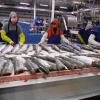
Options Magazine, Winter 2023: An international team of researchers explored a more inclusive and locally attuned approach to governance, challenging the existing top-down model and advocating for a holistic consideration of the socio-cultural and economic dimensions of Atlantic salmon fishing in Northern Fennoscandia.
Atlantic salmon fishing in Northern Fennoscandia is more than just a local source of food or means of outdoor recreation and nature-based tourism. It is a time-honored tradition for Arctic residents, whose ancestors have fished Northern Finland’s rivers for countless generations.
But in the modern world, there are many different questions—from ecological and sociocultural to legal and political—surrounding who has the right to fish salmon in these ancient rivers.
In a new study published in the journal Land, researchers explored these questions as perceived by stakeholders culturally, economically, or administratively attached to these rivers. Their findings demonstrate that the way salmon fishing is currently governed (from the top down) causes landscape injustice. This manifests as an unfair distribution of risks and benefits regarding fishing governance and its difficulties.
Results of the study also indicate the need for recognition and systemic evaluation of sociocultural and local economic aspects of salmon fishing, which are mostly ignored in favor of solely analyzing the overall ecological status of salmon populations.
“Atlantic salmon is connected to a variety of landscapes’ sociocultural, economic, and environmental values,” explains lead author Mia Landauer, a guest researcher in the IIASA Advancing Systems Analysis Program. “The study’s findings show that to advance towards more equitable environmental governance of Atlantic salmon, national and international policy decisions need to take into account the local sociocultural and economic components of Atlantic salmon fishing as well.”
By Jeremy Summers
This project, JUSTNORTH, was funded by the European Union’s Horizon 2020 research and innovation programme (grant agreement no.: 869327).
Publications
Landauer, M., Joona, J., & Keskitalo, P. (2023). Stakeholder Perceptions of Landscape Justice in the Case of Atlantic Salmon Fishing in Northern Finland. Land 12 (6) e1174. 10.3390/land12061174.